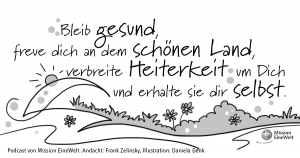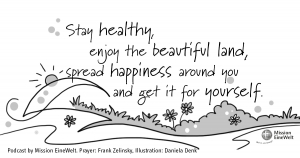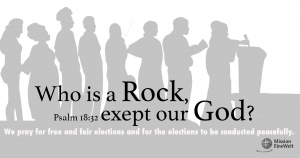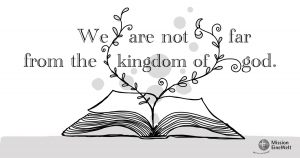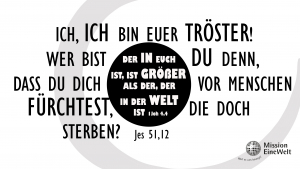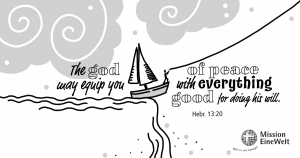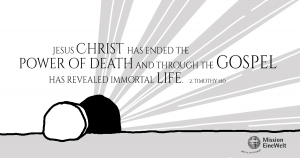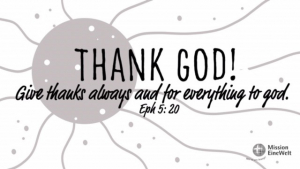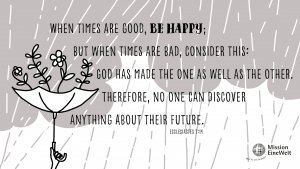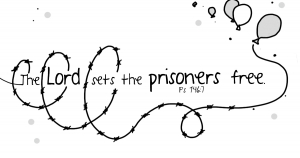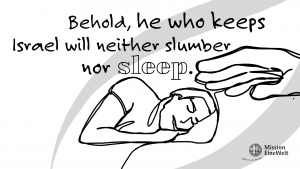Heute wird in Tansania gewählt: https://mission-einewelt.de/wahlen-in-tanzania-alles-wie-gehabt/
Es geht um die Präsidentschaft und die Zusammensetzung des Parlaments für ganz Tansania und für die Inseln Sansibars. Wer mehr über diese Wahlen wissen möchte, kann hier anfangen zu suchen: https://de.wikipedia.org/wiki/Wahlen_in_Tansania_2020.
Für Christ*innen ist es wichtig, sich nicht nur in Kirchengemeinden, sondern auch politisch zu engagieren. In Tansania geschieht das in den verschiedensten politischen Lagern. Auch Angehörige anderer Religionen sind aktiv. Viele von ihnen arbeiten für ein friedliches Miteinander und eine Entwicklung, die allen in Tansania zugutekommt. Lasst uns heute in unseren Gebeten an dieses Land und die Menschen denken, die in ihm leben.
- Wir bitten Gott, dass Tansanier*innen an das Wohl aller Menschen in Tansania denken, wenn sie heute wählen.
- Wir bitten Gott um freie und faire Wahlen und einen friedlichen Verlauf dieser Wahlen.
- Wir bitten Gott, dass die, die gewählt werden, nicht zuerst ihre eigenen Interessen verfolgen, sondern für ein Miteinander arbeiten, das ein Leben in Gerechtigkeit und Frieden für alle in Tansania zum Ziel hat.
Andacht: Michael Seitz, Referat Mission Interkulturell, Mission EineWelt
Illustration: Daniela Denk, Öffentlichkeitsarbeit, Mission EineWelt
Today elections are held in Tanzania. People vote for the Presidency and the members of Parliament for the whole of Tanzania and for the islands of Zanzibar. If you want to know more about these elections, you can start looking here: https://en.wikipedia.org/wiki/2020_Tanzanian_general_election.
It is important for Christians to get involved not only in congregations but also in politics. In Tanzania you find them in all political camps. Members of other religions are also active. Many are working for peaceful coexistence and development that benefits everyone in Tanzania. Let us remember this country and those living in it in our prayers today.
- We pray to God that Tanzanians will look to the welfare of all people in Tanzania when they vote today.
- We pray to God for free and fair elections and for the elections to be conducted peacefully.
- We pray to God that those who are elected do not pursue their own interests, but work together for a life in justice and peace for all Tanzanians.
Prayer: Michael Seitz
Illustration: Daniela Denk
Ich weiß wohl, es ist so: Wie könnte ein Mensch recht behalten gegen Gott. Hat er Lust, mit ihm zu streiten, so kann er ihm auf tausend nicht eines antworten. Hiob 9,2.3
Der Schriftgelehrte sprach zu Jesus: Ja, Meister, du hast recht geredet! Er ist einer, und ist kein anderer außer ihm; und ihn lieben von ganzem Herzen, von ganzem Gemüt und mit aller Kraft, und seinen Nächsten lieben wie sich selbst, das ist mehr als alle Brandopfer und Schlachtopfer. Da Jesus sah, dass er verständig antwortete, sprach er zu ihm: Du bist nicht fern vom Reich Gottes. Markus 12,32-34
Eine der Aussagen Jesu, die meine Aufmerksamkeit immer wieder erregt hat, lautet: „Mein Reich ist nicht von dieser Welt.“ Das war verwirrend für mich und ich stellte es oft in Frage; einige Zeit später half mir jedoch der folgende Satz, zum besseren Verstehen: „In dem Maße, in dem wir uns für ein gerechteres und brüderlicheres Zusammenleben von Mensch und Natur einsetzen, werden wir hier auf Erden Zeichen des Reiches Gottes säen.“ Ah! Sein Reich ist nicht von dieser Welt, aber wir können Dinge tun, die uns dem Reich Gottes näher bringen. Die Lektüre von Hiob erinnert mich an die Erfahrung, die viele von uns machen, wenn wir im Konflikt über die Existenz oder Nicht-Existenz Gottes stehen, und noch mehr, wenn wir mehr und mehr über diesen Gott wissen wollen. Auch in Zeiten von Wohlstand und Normalität. Wir durchleben Verleugnung, Zweifel, versuchen, uns vor ihm zu verstecken, ihm in vielerlei Hinsicht auszuweichen. Ohne die Tatsache außer Acht zu lassen, dass wir sein Handeln sowohl im Privatleben als auch im öffentlichen Bereich beurteilen. In Wirklichkeit haben wir die meiste Zeit das Gefühl, dass Gott nicht handelt, und deshalb ist es schwierig zu erkennen, wie, wann, wo und durch wen er handelt. Tatsächlich sind wir diejenigen, die handeln, und manchmal minimieren wir diese Tatsache. Der Begleittext sagt uns, dass die Schriftgelehrten und die Gesetzeslehrer aus dem Munde Jesu wissen wollen, welches das größte Gebot ist, und nach der Antwort Jesu nennen die Schriftgelehrten ihn: Lehrer, du hast richtig gesprochen. Jesus erinnert uns an die Grundlagen über Gott und das Leben. Jesus bringt das Reich Gottes, die Liebe zu Gott und zum Nächsten, praktisch auf den Punkt. Wenn wir uns an die jüngste Vergangenheit erinnern und all die Handlungen genau betrachten, die die verschiedenen Ausdrucksformen der Liebe zum „Anderen“ widerspiegeln und die für die menschliche Entwicklung und die Sorge für Natur- und Klimagerechtigkeit und andere Aspekte des Lebens entwickelt wurden, werden wir sehen, dass wir nicht weit vom Reich Gottes entfernt sind. Und dass die Erinnerung daran, unsere Pflicht auch in schwierigen Zeiten getan zu haben, danach immer angenehm sein wird, vielleicht nicht für uns, aber für die neuen Generationen.
Andacht: Sergio Rios Carrillo, Referat Entwicklung und Politik, Mission EineWelt
Illustration: Daniela Denk, Öffentlichkeitsarbeit, Mission EineWelt
Una de las expresiones de Jesús que siempre me ha llamado mucho la atención es; “mi reino no es de este mundo”. Era confusa para mí y la cuestionaba mucho; sin embargo, la siguiente frase me ayudó a comprenderla mejor; “en la medida que actuemos a favor de una convivencia más justa y fraterna entre los seres humanos y la naturaleza estaremos sembrando signos del reino de Dios aquí en la tierra”. Su reino no es de este mundo, pero podemos hacer cosas que nos acerquen al reino de Dios. La lectura de Job me recuerda a la experiencia que muchos tenemos cuando entramos en conflicto sobre la existencia o no de Dios, y más fuerte aun cuando queremos saber más y más sobre ese Dios. Pasamos por la negación, la duda, tratamos de ocultarnos de él, le evitamos de muchas formas. Sin dejar a un lado el hecho de juzgar sus procedimientos tanto en la vida privada como en la esfera pública. El poder con el que Dios actúa, es muchas veces incomprensible para nosotros. En realidad, la mayoría de las veces sentimos que no actúa y por lo tanto es difícil identificar cómo, cuándo, dónde y a través de quienes actúa. La lectura del texto de acompañamiento narra que los escribas y los maestros de la ley quieren saber de la boca de Jesús cuál es el mayor mandamiento y después de la respuesta de Jesús, los escribas le llaman, maestro has hablado correctamente. Jesús nos recuerda lo básico sobre Dios y la vida. Jesús hace prácticamente un resumen del reino de Dios, amar a Dios y amar al prójimo. Si recordamos al reciente pasado y observamos con atención todas las acciones que reflejan las diferentes expresiones de amor hacia el “otro” y que se han desarrollado en pro del desarrollo humano y el cuido de la naturaleza y la justicia climática y otros aspectos de la vida, veremos que no estamos lejos del reino de Dios. Y que el recuerdo de haber cumplido con nuestro deber aun en tiempos difíciles siempre será grato después, quizá no para nosotros, sino para las generaciones venideras.
Sergio Rios Carrillo
Dabiela Denk
How can a man be in the right before God? If one wished to dispute with him, he could not answer him once in a thousand times. Job 9:2,3
The scribe said to Jesus, “You are right, Teacher; you have truly said that ‘he is one, and besides him there is no other’; and ‘to love him with all the heart, and with all the understanding, and with all the strength,’ and ‘to love one’s neighbor as oneself,’—this is much more important than all whole burnt offerings and sacrifices.” When Jesus saw that he answered wisely, he said to him, “You are not far from the kingdom of God.” Mark 12:32-34
One of the expressions of Jesus, which always caught my attention, is: „My kingdom is not of this world“. It was confusing for me and I often questioned it; but some time later, the following sentence helped me to understand it better: „To the extent that we work for a more just and fraternal coexistence of man and nature, we will sow signs of the Kingdom of God here on earth“. Ah! His kingdom is not of this world, but we can do things that bring us closer to the kingdom of God. Reading Job reminds me of the experience many of us have when we are in conflict over the existence or non-existence of God, and even more so when we want to know more and more about this God. Even in times of prosperity and normality. We live through denial, doubt, trying to hide from him, avoiding him in many ways. Without ignoring the fact that we judge his procedures both in private and public life. In reality, most of the time we have the feeling that God does not act, and therefore it is difficult to know how, when, where and by whom he acts. In fact, we are the ones who act, and sometimes we minimize this fact. The reading of the accompanying text tells us that the scribes and teachers of the law want to know from the mouth of Jesus, which is the greatest commandment, and after Jesus‘ answer, the scribes call him: „Teacher, you have spoken correctly. Jesus reminds us of the basics about God and life. Jesus brings the Kingdom of God, the love of God and neighbour, practically to the point. If we remember the recent past and look closely at all the actions that reflect the different expressions of love for „the other“, which were developed for human development and care for natural and climatic justice and other aspects of life, we will see that we are not far from the Kingdom of God. And that the memory of having done our duty even in difficult times will always be pleasant afterwards, perhaps not for us, but for the new generations.
Prayer: Sergio Rios Carrillo
Illustration: Daniela Denk
Ich, ich bin euer Tröster! Wer bist du denn, dass du dich vor Menschen fürchtest, die doch sterben? Jesaja 51,12
Der in euch ist, ist größer als der, der in der Welt ist. 1.Johannes 4,4
„Ich glaube […] an die Auferstehung der Toten und das ewige Leben.“ – so bekennen wir in beinahe jedem Gottesdienst, wenn wir das Glaubensbekenntnis sprechen.
Aber trotzdem habe ich manchmal Angst vor der Welt, fürchte Mitmenschen und Ereignisse.
Was ist mit dieser Perspektive, die ich im Glaubensbekenntnis bezeuge?
Gott weist darauf hin: Wer bist du denn, dass du dich vor Menschen fürchtest?
Ich, dein Gott, habe ganz andere Möglichkeiten, ich bin größer als diese Welt.
Ein Vorwurf? Warum glaube ich das nicht und traue meinem Gott nicht diese Fähigkeit zu?
Doch Gott reagiert hier nicht vorwurfsvoll. Er wendet sich nicht enttäuscht ab, weil uns Zweifel kommen und die Furcht uns Menschen oft beherrscht.
Nein, er ist der Tröster. Obwohl er größer ist als alle Welt, nimmt er sich mir kleinem Mensch an und sagt mir: Ich bin dein Tröster! Hab keine Furcht vor diesen Dingen, die in der Welt auf dich einstürmen. Durch mich an deiner Seite hast du eine ganz andere, weite Perspektive.
Aber dieser Gott will nicht vertrösten. Unsere Sorgen und Nöte sind ernstgenommen, wenn er sagt: Ich bin euer Tröster.
Andacht: Jannis Fischer, Referat Partnerschaft und Gemeinde, Mission EineWelt
Illustration: Daniela Denk, Öffentlichkeitsarbeit, Mission EineWelt
I, even I, am he that comforteth you: who art thou, that thou art afraid of man that shall die Isaiah 51:12
Because greater is he that is in you than he that is in the world. 1.John 4:4
„I believe […] in the resurrection of the dead and life everlasting“. – this is how we confess in almost every service.
But still I am sometimes afraid of the world, afraid of other human beings and also afraid of things that might happen.
What about this perspective, which I testify in the Creed?
God points this out: Who are you that you fear people?
I, your God, have completely different possibilities, I am greater than this world.
An accusation? Why do I not believe this and do not trust my God with this ability?
But God does not react reproachfully here. He does not turn away disappointed, because doubts come to us and fear often dominates us humans.
No, he is the comforter. Although he is greater than all the world, he takes care of me little man and tells me: I am your Comforter! Do not be afraid of these things that are coming at you in the world. With me at your side you have a completely different, broad perspective.
But this God will not put you off. Our worries and needs are taken seriously when he says: I am your comforter.
Prayer: Jannis Fischer
Illustration: Daniela Denk
Der Gott des Friedens, der den großen Hirten der Schafe, unsern Herrn Jesus, von den Toten heraufgeführt hat durch das Blut des ewigen Bundes, der mache euch tüchtig in allem Guten, zu tun seinen Willen, und schaffe in uns, was ihm gefällt. Hebräer 13,20-21
Das Gute tun. – Viele Leute glauben an „das Gute im Menschen“. Christ*innen glauben nur eingeschränkt an das Gute im Menschen. Sie gehen davon aus, dass da auch immer viel Murks in einem drin ist. Christen glauben an das Göttliche im Menschen, das uns erst befähigt, das Gute zu tun. Wir auf uns allein gestellt, erleben uns oft völlig ohnmächtig, das Gute zu tun. Corona schränkt unseren Handlungsspielraum ein. Die Lebensmittel sind in Plastik verpackt. Die Gewinnmaximierung ist die oberste Priorität in unserm Land, egal welche Nebenwirkungen das hat. Nur ein Beispiel: die enorme Steigerung der Immobilienpreise und die dadurch bedingte Zunahme der Obdachlosigkeit. Zahlreiche Konflikte um uns herum, die uns lähmen und erschüttern. Aus all diesen Unheils-Zusammenhängen kommt der*die Einzelne ja gar nicht raus. Manchmal sind wir dann deshalb auch gar nicht mehr motiviert, das Gute zu tun. Das Gute. Das Gute tun. Einfach ist das nicht! Deshalb wenden sich Christ*innen an ihren Gott und bitten um seinen Beistand. Dass er uns das zeigt, was wir tatsächlich leisten können und was sinnvoll ist. Das können ja auch kleine Schritte sein. Geduld ist unerlässlich. Aber auch Hartnäckigkeit. Gottes guter Geist begleite uns auf diesem Weg! „Der Gott des Friedens mache Euch tüchtig zu allem Guten!“ Alles Gute dabei!
Andacht: Christoph von Seggern, Regionalstelle Nordbayern, Mission EineWelt
Illustration: Daniela Denk: Öffentlichkeitsarbeit, Mission EineWelt
Now may the God of peace, who made that great keeper of his flock, even our Lord Jesus, come back from the dead through the blood of the eternal agreement, make you full of every good work and ready to do all his desires, working in us whatever is pleasing in his eyes through Jesus Christ. Hebrews 13:20-21
Doing the good. – Many people believe in „the good in people“. Christians believe in the good in people only to a limited extent. They assume that there is also always a lot of mess in one. Christians believe in the divine in man, which enables us to do the good. We are left on our own and often experience ourselves completely powerless to do the good. Corona restricts our scope of action. The food is packed in plastic. Profit maximization is the top priority in our country, no matter what the side effects are. Just one example: the enormous increase in property prices and the resulting increase in homelessness. Numerous conflicts around us that paralyze and shake us. From all these disaster contexts the *the individual does not come out at all. Sometimes we are no longer motivated to do good. The good. To do the good. It is not easy! This is why Christians turn to their God and ask for His help. That He shows us what we can actually do and what is meaningful. These can also be small steps. Patience is essential. But also persistence. May God’s good spirit accompany us on this path! „May the God of peace make you capable of all good things! All the best for it!
Prayer: Christoph von Seggern
Illustration: Daniela Denk
Christus Jesus hat dem Tode die Macht genommen und das Leben und ein unvergängliches Wesen ans Licht gebracht! 2. Timotheus 1,10
Die Frage von Tod und Leben spielt gerade in den Zeiten der weltweiten Pandemie eine große Rolle. Zahlen von Infektionszahlen und Todesfällen stehen ganz vorne in den Nachrichtenmeldungen. Sie beunruhigen und verunsichern. Ja, die Frage nach dem eigenen Leben und wie wir mit diesem Geschenk umgehen, wird in Zeiten der Lebensgefahr noch einmal sehr konkret. Der Hinweis aus der Tageslosung sollte in diesem Zusammenhang nicht als Freifahrtschein zur Sorglosigkeit verstanden werden. Er ist vielmehr eine Ermutigung zu einem verantwortungsvollen Umgang mit dem Lebensgeschenk, der vor dem Tod keine Angst haben muss. Jesus Christus hat den Tod nicht abgeschafft, aber er hat ihm als Teil des Lebens die alles beherrschende Macht genommen. Auch und besonders in Zeiten der Lebensbedrohung kann dies Möglichketen zum Handeln eröffnen. Nutzen wir sie!
Andacht: Hanns Hoerschelmann, Direktor Mission EineWelt
Illustration: Daniela Denk, Öffentlichkeitsarbeit, Mission EineWelt
Jesus Christ has ended the power of death and through the gospel has revealed immortal life. 2. Timothy 1:10
The question of death and life plays a major role, especially in times of the global pandemic. Infection numbers and deathrates are at the forefront of the news. We are worried and unsetteled! In times of mortal danger, the question of our own life and how we use this gift of life becomes a major issue. The daily watchword should therefore not be understood as a free ticket for carelessness. Rather, it is an encouragement to deal responsibly with the gift of life without having to be afraid of death. Jesus Christ did not abolish death, but he did take away all ruling power from it as part of life. Especially in times of life threatening this can open up possibilities for action. Let’s use it!
Prayer: Hanns Hoerschelmann, Director Mission OneWorld
Illustration: Daniela Denk, public relations, Mission OneWorld
Sagt Dank Gott, dem Vater, allezeit für alles. Epheser 5,20a
„Gott sei Dank“ – das sage ich relativ häufig – meistens ohne weiter darüber nachzudenken.
Aber einen guten Grund habe ich immer. Zum Beispiel:
Ich sitze im Auto und will nach vorne ausparken. Es ist ein bisschen unübersichtlich. Ich schaue nach links, ich schaue nach rechts – nichts kommt. Und während ich so schaue, und nach vorne rolle, kommt von links ein Fahrradfahrer! – Dabei wollte ich gerade noch mehr aufs Gas gehen! – Der Fahrradfahrer weicht gerade so noch aus. Recht freundlich schaut er nicht, aber – Gottseidank! – das ist ja nochmal gutgegangen!
„Gott sei Dank“!
Wenn ich darüber nachdenke, was ich da sage, wird mir etwas klar: Ich selber war das gerade gar nicht, die dafür gesorgt hat, dass nichts schiefgegangen ist. War es Zufall? – Das schließe ich nicht aus.
Warum dann also: „Gott sei Dank“? – Mir fällt dazu nur ein: Mein Glück verdanke ich nicht nur mir selbst. Vieles, was gut geht, klappt ohne mein Dazutun.
Gut zu wissen, dass es mehr gibt als das, was ich kann. Gut zu wissen, dass Gott mehr kann als ich. – Da kann man schon mal Danke sagen.
Ich wünsche allen, die dies lesen, dass sie heute wenigstens einmal aus tiefstem Herzen sagen können: „Gott sei Dank“.
Andacht: Ulrike Bracks
Illustration: Daniela Denk
Always give thanks to God the Father for everything. Give thanks to him in the name of our Lord Jesus Christ. Ephesians 5:20
„Thank God“ – I say this relatively often – mostly without thinking about it further.
But I always have a good reason. For example:
I’m sitting in my car and want to park out in front. It is a bit difficult. I look to the left, I look to the right – nothing comes. And while I look around and roll forward, a cyclist comes from the left! – And I just wanted to accelerate! – The cyclist just barely swerves. He does not look very friendly, but – thank God! – that went well once again!
„Thank God“!
When I think about what I’m saying, I realize something: It wasn’t me who made sure that nothing went wrong. Was it coincidence? – I am not ruling that out.
So why then: „Thank God“? – All I can say is: I owe my luck not only to myself. A lot of things that work out well work out without my doing them.
It is good to know that there is more than what I can do. Good to know that God can do more than I can. – You can say thank you for that.
I wish all of you who are reading this that you can say at least once today, from the bottom of your heart, „Thank God“.
Prayer: Ulrike Bracks
Illustration: Daniela Denk
Freu dich, wenn du einen Glückstag hast. Und wenn du einen Unglückstag hast, dann denke daran: Gott schickt dir beide, und du weißt nicht, was als Nächstes kommt. Prediger 7,14
Hochs und Tiefs …
… gibt es nicht nur als Wetterlage, sondern wir erleben sie auch in unserem Alltag. Dabei kann das, was jemand als Glück bzw. als Unglück empfindet, sehr unterschiedlich sein.
Während sich die Hobbygärtnerin über einen Regentag freuen mag, weil sie nicht gießen muss, fühlt sich der Wanderer vielleicht um einen Urlaubstag betrogen, weil er seine geplante Tour nicht machen kann.
Der Prediger Salomo erinnert uns daran, dass wir uns über die guten und schönen Dinge vorbehaltlos freuen dürfen, denn es sind Geschenke von Gott, mit denen er uns eine Freude machen will. Dass aber auch das Schwere und Traurige von Gott kommt, hilft zu verstehen, dass wir nicht einem blinden Schicksal oder gar irgendwelchen finsteren Mächten ausgeliefert sind, sondern dass Gott auch diese Dinge unter seiner Kontrolle hat.
Bei allem, was heute geschieht, ist Gott an deiner Seite, egal ob es dir gerade zum Weinen ist, oder ob du fröhlich lachen kannst. Gott ist da!
Andacht: Michael Volz, Referat Partnerschaft und Gemeinde, Mission EineWelt
Illustration: Daniela Denk, Öffentlichkeitsarbeit, Mission EineWelt
When times are good, be happy; but when times are bad, consider this: God has made the one as well as the other. Therefore, no one can discover anything about their future. Ecclesiastes 7:14
Highs and lows …ups and downs …
… are not just weather conditions, we also experience them in our everyday life. What someone perceives as happiness or unhappiness can be very different.
While the hobby gardener may be happy about a rainy day because she does not have to water, the hiker may feel cheated out of a vacation day because he cannot do his planned tour.
The teacher Solomon reminds us that we can rejoice unreservedly about the good and beautiful things, because they are gifts from God with which he wants to make us happy. But the fact that the difficult and sad are also from God helps us to understand that we are not at the mercy of a blind fate or even some dark forces, but that God also has these things under his control.
In everything that happens today, God is by your side, regardless of whether you are crying or whether you can laugh happily. God is near!
Prayer: Michael Volz
Illustration: Daniela Denk
Der Herr macht die Gefangenen frei. Psalm 146,7
Wenn euch nun der Sohn frei macht, so seid ihr wirklich frei. Johannes 8,36
Freiheit – sie ist oft besungen, unter großen Opfern erkämpft worden, wohl ein Grundbedürfnis der menschlichen Existenz. Auch in der heutigen Zeit: Der Mensch will frei sein, von nichts und niemandem abhängig.
Der Sohn macht mich frei. Freiheit und Befreiung – brauche ich die denn? Bin ich gefangen? Ich habe keine Gitter vor dem Fenster, lebe in einem Land, in dem die Persönlichkeits- und Freiheitsrechte gewährleistet sind.
Aber es geht nicht um die Freiheit, die sich durch das Fehlen der Gitter vor dem Fenster auszeichnet, nicht nur um die Freiheit von Unterdrückung oder Unrecht.
Vielmehr ist es die Freiheit zum Leben, die ich geschenkt bekomme, wenn der Sohn, wenn Jesus Christus mich frei macht. Es geht darum, „wirklich frei“ zu sein. Das geht weit über den Begriff der Freiheit, wie er landläufig verwendet wird, hinaus.
Diese wirkliche Freiheit wird für mich besonders in einem Lied nach einem Gedicht von Hanns Dieter Hüsch deutlich, das ich in der Jugendarbeit oft gesungen und gehört habe:
„Ich bin vergnügt, erlöst, befreit, Gott nahm in seine Hände meine Zeit. Mein Fühlen, Denken, Hören, Sagen, mein Triumphieren und Verzagen, das Elend und die Zärtlichkeit. Was macht, dass ich so furchtlos bin an vielen dunklen Tagen? Es kommt ein Geist in meinen Sinn, will mich durchs Leben tragen.“
Jesus Christus nimmt sich nicht nur der Gitter vor dem Fenster an. Macht er mich frei, so ist mein Leben befreit und erlöst. Das bedeutet nicht, dass mir nichts passieren oder zustoßen kann, aber wenn der Sohn mich frei macht, wenn Gott meine Zeit in seinen Händen hält, dann kann mir nichts geschehen.
Andacht: Jannis Fischer, Referat Partnerschaft und Gemeinde, Mission EineWelt
Illustration: Daniela Denk, Öffentlichkeitsarbeit, Mission EineWelt
The LORD sets the prisoners free. Psalm 146:7
If then the Son sets you free, you will be truly free. John 8:36
Freedom – it has often been sung about, fought for with great sacrifice, probably a basic need of human existence. Also in the present time: Man wants to be free, dependent on nothing and nobody.
The son makes me free. Freedom and liberation – do I need them? Am I a prisoner? I have no bars in front of the window, I live in a country where personal rights and freedom are guaranteed.
But it is not about freedom, which is characterized by the absence of bars in front of the window, not only freedom from oppression or injustice.
Rather, it is the freedom to live that I am given when the Son, when Jesus Christ sets me free. It is about being „truly free“. This goes far beyond the concept of freedom as it is commonly used.
This real freedom becomes especially clear to me in a song based on a poem by Hanns Dieter Hüsch, which I often sang and heard in youth work:
„I am happy, redeemed, liberated, God took my time in his hands. My feeling, thinking, hearing, saying, my triumphing and despairing, the misery and tenderness. What makes me so fearless on many dark days? A spirit comes into my mind, wants to carry me through life.“
Jesus Christ not only takes care of the bars in front of the window. If he makes me free, my life is freed and redeemed. This does not mean that nothing can happen to me, but if the Son makes me free, if God holds my time in His hands, I am not really determined by things happening to me.
Prayer: Jannis Fischer
Illustration: Daniela Denk
Siehe, der Hüter Israels schläft noch schlummert nicht. Psalm 121,4
Stimmt das? Gott schläft nicht? Manchmal bezweifelten das selbst die Psalmbeter: „Wache auf, Herr! Warum schläfst du?“ (Psalm 44,24).
Oder es gibt das wunderschöne biblische Zeugnis, dass Gott sich ausgedehnte Pausen gönnen kann: „…und ruhte am siebenten Tage von allen seinen Werken!“ (1. Mose 2,2).
Ich lebe von der Hoffnung, dass Gott sich frisch, erholt und rechtzeitig wieder bei mir melden wird – auch wenn ich gerade den Eindruck habe, er würde das Wichtigste verschlafen.
Für meinen Teil bin ich jedenfalls froh, nicht Gott sein zu müssen. Ich brauche meinen Schlaf.
Andacht: Klaus Dotzer, Referat Afrika, Mission EineWelt
Illustration: Daniela Denk, Öffentlichkeitsarbeit, Mission EineWelt
Behold, he who keeps Israel will neither slumber nor sleep. Psalm 121:4
Is this true? God does not sleep? Sometimes even the psalmists doubted this: „Awake, Lord! Why do you sleep? Rouse yourself!“ (Psalm 44:23)
Or there is the beautiful biblical testimony that God can take extended breaks: „…on the seventh day he rested from all the work! (Genesis 1:31).
I live in the hope that God will come back to me rested, refreshed and in time – even if it sometimes seemed to me that he would sleep through the most important things of my life.
For my part, I am glad not to be God. I need my sleep.
Prayer: Klaus Dotzer
Illustration: Daniela Denk
Kontakt
Postanschrift / Adresse
Postfach 68, 91561 Neuendettelsau
Hauptstraße 2, 91564 Neuendettelsau
Telefon: 09874 9-0, Fax: 09874 9-330
Mail:
Spenden
Zentrales Spendenkonto
IBAN: DE12 5206 0410 0001 0111 11
BIC: GENODEF1EK1
Evangelische Bank eG

